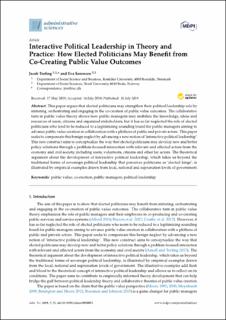| dc.contributor.author | Torfing, Jacob | |
| dc.contributor.author | Sørensen, Eva | |
| dc.date.accessioned | 2020-06-04T08:13:15Z | |
| dc.date.available | 2020-06-04T08:13:15Z | |
| dc.date.created | 2020-01-20T12:30:58Z | |
| dc.date.issued | 2019 | |
| dc.identifier.citation | Torfing, J. & Sørensen, E. (2019). Interactive political leadership in theory and practice: How elected politicians may benefit from co-creating public value outcomes. Administrative Sciences, 9(3). doi: | en_US |
| dc.identifier.issn | 2076-3387 | |
| dc.identifier.uri | https://hdl.handle.net/11250/2656478 | |
| dc.description.abstract | This paper argues that elected politicians may strengthen their political leadership role by initiating, orchestrating and engaging in the co-creation of public value outcomes. The collaborative turn in public value theory shows how public managers may mobilize the knowledge, ideas and resources of users, citizens and organized stakeholders, but it has so far neglected the role of elected politicians who tend to be reduced to a legitimizing sounding board for public managers aiming to advance public value creation in collaboration with a plethora of public and private actors. This paper seeks to compensate this benign neglect by advancing a new notion of ‘interactive political leadership’. This new construct aims to conceptualize the way that elected politicians may develop new and better policy solutions through a problem-focused interaction with relevant and affected actors from the economy and civil society, including users, volunteers, citizens and other lay actors. The theoretical argument about the development of interactive political leadership, which takes us beyond the traditional forms of sovereign political leadership that perceives politicians as ‘elected kings’, is illustrated by empirical examples drawn from local, national and supranation levels of government | en_US |
| dc.language.iso | eng | en_US |
| dc.publisher | MDPI AG | en_US |
| dc.rights | Navngivelse 4.0 Internasjonal | * |
| dc.rights.uri | http://creativecommons.org/licenses/by/4.0/deed.no | * |
| dc.title | Interactive political leadership in theory and practice: How elected politicians may benefit from co-creating public value outcomes | en_US |
| dc.type | Peer reviewed | en_US |
| dc.type | Journal article | en_US |
| dc.description.version | publishedVersion | en_US |
| dc.rights.holder | © 2019 The Author(s) | en_US |
| dc.subject.nsi | VDP::Samfunnsvitenskap: 200::Statsvitenskap og organisasjonsteori: 240 | en_US |
| dc.source.pagenumber | 18 | en_US |
| dc.source.volume | 9 | en_US |
| dc.source.journal | Administrative Sciences | en_US |
| dc.source.issue | 3 | en_US |
| dc.identifier.doi | 10.3390/admsci9030051 | |
| dc.identifier.cristin | 1777605 | |

